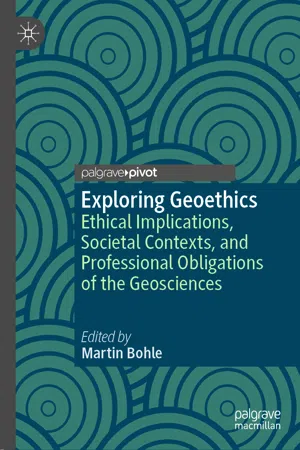This book takes stock of the field of geoethics. This chapter highlights the purpose of the book, the context for writing it and the limits to its scope. It sets the scene by introducing the relevance of geoethics, how it relates to professional matters pertaining to the geosciences and its broader application to other fields of study and interest.
Contemporary geosciences refer to a range of applied and fundamental research fields within and beyond natural sciences, as well as engineering disciplines and related commercial undertakings. Traditionally, the term ‘Earth system’ refers to the Earth’s physical, chemical and biological constituents and the processes that determine the interactions that transform or transfer matter, energy and information. Over recent centuries, ‘geosciences’ (or ‘Earth sciences’) have evolved into a set of basic and applied, scientific and engineering disciplines to study natural systems and human-built systems that intersect with one another.
Within the last decade, geoscientists have shaped the notion of ‘geoethics’ to frame inquiries into two subjects, namely: (1) the responsible behaviour of professionals in geosciences and (2) the societal relevance of geosciences. These inquiries (see Peppoloni and Di Capua 2017) have led to the exploration of the societal, cultural and philosophical contexts and implications of geoscience knowledge, research, practice, education and communication. Thinking about the implications and applications of geoethics, or ‘geoethical thinking ’, can be located within broader societal concerns about the responsible conduct of science and the science–society interface. How individuals such as geoscientists act when exercising their profession, for example, is relevant to the functioning of modern societies (Press 2008).
When arranging the matters that belong to the realm of geoethical thinking, a geoscientist may be inclined to employ as a metaphor a sphere consisting of a core with concentric layers around it. The core would consist of amalgamated general and professional ethics that applies to geosciences, to their particularities and to individual geoscientists. The first layer around the core would comprise ethical issues that challenge the professional activities of geoscientists. Around this layer, a geo-professional mind may perceive an outer shell of various societal considerations which, like tectonic plates, spread, collide and subduct one another. Evidently, this metaphor has a professional bias, and a philosopher of science may find it annoying. Nevertheless, such a metaphor may assist the reader to follow the lines of thought as they are presented in this book.
Within such a metaphor, the core and the adjacent layer represent the status quo of geoethics (Chapter 2), which might be called ‘enriched geo-professional ethics ’. Studying these matters triggers thoughts about the wider relevance of geoethical thinking. Therefore the two subsequent chapters gather several essays that explore the societal relevance of geosciences, first taking a view which is anchored in daily experiences (Chapter 3) and second, offering a more conceptual overview of some geoethical concepts and applications (Chapter 4). Among the matters addressed are the day-to-day functioning of modern societies that intensively apply geoscience knowledge; governance issues and the quest for normative frameworks within Earth system sciences; the need to embrace participatory practices in geoscience; and how to apply geoscience knowledge to give meaning to human behaviour. Drawing on such reflections opens inquiries about the purpose of geoethics when building what has been termed the ‘human niche ’ (Fuentes 2016), that is, the natural space shaped and occupied by humans. These reflections and inquiries enlarge the perimeter of matters that geoethical thinking may include beyond its traditional scope. Consequently, the question arises (Chapter 5) whether this perimeter is getting too comprehensive, so that the notion of geoethics risks no longer being a meaningful concept, either for geoscientists or for citizens. Other concepts, such as ‘environmental ethics ’ (Hourdequin 2015) or ‘sustainability ethics ’ (Becker 2012; Rozzi et al. 2015), may be considered better suited than geoethics to frame some of these matters. Given this concern, the authors have looked for concepts that would be complementary to geoethics or that could describe reflections and inquiries at or beyond the boundaries of geoethical thinking. When studying the interfaces between geosciences, social sciences and humanities (Kagan 2009), for example, a concept such as ‘geo-humanities ’ may be deemed suitable. It seems to be one option (of several) to reflect on insights that, for example, emerge from climate change research or subjects such as anthropogenic global change , geoengineering or the Gaia hypothesis . In closing, the book keeps this question at least partially open, seeking suggestions from constituencies other than geosciences.
1.1 Context and Purpose of Geoethical Inquiries
As sketched above, geosciences address the functioning of the Earth system as well as the use of non-living resources. Likewise, geosciences are instrumental in...
